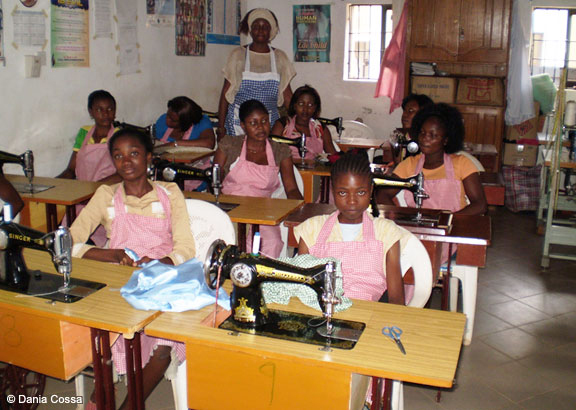

Nigeria 2
3. Women empowerment activities (information, counseling, orientation, education, training, skill acquisition, micro-crediting)

Experience gained with the implementation of anti-trafficking projects suggest that preventive strategies should adopt measures which produce results in the short term, such as information and awareness raising campaigns, as well as measures in addressing the underlying causes of trafficking, id est conditions determining the high exposure of minors and young women to trafficking practices and networks in a medium and long term perspective.
In order to assist in the prevention of human trafficking, there is a clear need for carrying out of activities addressing the root causes and the dramatic consequences of this crime. The aim is to facilitate the rehabilitation and reintegration of victims and to allow actual and potential victims to find viable alternative options to make a decent living. In this light, the need of empowering young women and minors and improving their socio-economic status is evident. Lessons learned from Phase 1 of the Programme suggest that, despite increased access to information, young women and minors urgently require training, education and micro-finance to start up an income-generating activity.
These activities help equip minors and young women with greater self-confidence and self-esteem, knowledge and skills as well as financial and material means that they require in order to cater for their own needs and their families’. In brief, a “minimum empowerment package” is offered to pursue a viable economic alternative in their local context to that of being trafficked.
Human trafficking prevention and women empowerment activities, under the overall supervision of NAPTIP, are taken care of by the Edo State NGO Coalition Against Trafficking in Persons (ENCATIP) created during phase 1 of the Programme and consisting of 6 following NGOs:
- African Women Empowerment Guild (AWEG);
- Committee for the Support of the Dignity of Women (COSUDOW);
- Girls Power Initiative (GPI) Edo State;
- Idia Renaissance;
- International Reproductive Rights Research Action Group (IRRRAG-Nigeria) Edo State;
- Women Action Initiative (WAI)
Since December 2008, ENCATIP, in close cooperation with NAPTIP, started assisting vulnerable target groups and victims of human trafficking in finding viable alternative strategies to exit poverty and to become economically independent. The services provided are:
- Assistance in family reunification;
- Information providing;
- Psycho-social, health and professional counseling;
- Education and vocational training;
- Skill acquisition and small loans for income generating purposes.
In terms of possibilities for establishing micro-businesses, UNICRI recruited a research team from Benin City University to carry out an evaluation report of micro-credit activities of phase 1 with the aim of determining the scale of the activities impact and to identify possible improvements to be adopted in micro-credit activities during phase 2 of the Programme.
An individually tailored ‘minimum empowerment package’: individual monitoring, ongoing counseling and assistance was provided to the primary beneficiaries at the local level, until they were sufficiently autonomous in pursuing their ventures on their own.
In order to ensure that victims of human trafficking and vulnerable groups can succeed in developing and managing a small income-generating activity, orientation courses and training activities have been carried out, including micro-business feasibility studies, business plan development, business management, accounting and loan repayment.
The orientation for the first 62 beneficiaries was carried out on 9 January 2009, and this first group of beneficiaries was trained by ENCATIP on 14-16 January 2009. On 30 January 2009, beneficiaries officially received from ENCATIP the necessary equipment for the start of small business activities. In September 2009, the selection of the second group of beneficiaries took place under the coordination of UNODC and in presence of the NAPTIP Focal Point.
As part of the women empowerment activities and in preparation of the micro credit loans, the beneficiaries participated in the inception training course. Issues covered by the training ranged from self esteem skills to micro credit management, as follows:
- Body Image;
- Values and Value Clarification;
- Self Esteem;
- Vision and Goal Setting;
- Decision Making;
- Assertiveness;
- Communication;
- Gender and Gender Roles;
- Negotiation and Refusal Skills;
- Personal Financial Management;
- Migration Trafficking and Smuggling;
- Trafficking Tricks, Bondage, Rituals and Routes;
- Life of the Trafficked Girls and Consequence of Trafficking;
- Leadership.
The businesses started under ENCATIP supervision include: petty trading, hairdressing, computer and GSM business and various kinds of sales. The beneficiaries were closely assisted, counseled and monitored by UNODC and the relevant sponsoring NGOs. Moreover, ENCATIP carries out monthly meetings with the beneficiaries in group as well as individual counseling meetings.
A total of 111 micro credit loans, 21 education grants and 33 skills acquisition grants were dispersed. From lessons learned and feedback from the first group of micro credit loans the second group were given larger loans and thus fewer women were chosen overall. The education grants were given to a various age range from primary school to university including both victims and vulnerable persons. The skill acquisition grants were given again to both victims and vulnerable persons in various specialities including hairdressing, catering, computer training, fashion design etc. The loans have so far had a revolving rate of about 60%.



